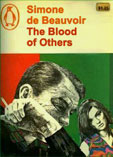Simone de Beauvoir is well-known as a feminist existentialist but in this book the feminist note is played in a minor key, not because it is unimportant, but because a symphonic work such as this brings together hundreds of notes, themes, and melodies in a complex interrelation of all the forces of which it is composed.
On one hand, the ideas and the characters in this book are like weather systems, which need to be seen from a high vantage point in order to comprehend the whirl of forces at work. On the other hand de Beauvoir, a practitioner of extreme consciousness, is able to illuminate every character in almost blinding detail. The apparent contradiction between each character's individual consciousness, and their absurd involvement in (and responsibility towards) a greater world is what de Beauvoir sets out to describe and to some extent reconcile. There are a number of reconciliations going on throughout the book, and these conflicts are embodied in the book's characters.
Jean Blomart the protagonist embodies several conflicts. The wealthy heir to a Parisian printing firm, he is assailed from a young age by feelings of guilt and responsibility emanating from his mother. Madame Blomart sees all the suffering in the world but, unable to act in order to change things, maintains the view that "the wrong lies not in the institutions but in the depths of our being." Original Sin foams through her veins like thick swamp-blood, and in order to assuage her bad conscience she makes "little reticent steps" in order to take up as little space on the earth as possible. Jean internalises his mother's guilt and finds a ready-made home for it in the printer's workshop beneath his apartment — the humming of the machines and the rising dust fumes are figuratively but also literally the toil of the working classes rising to the bourgeois living-space above.
Jean's naïveté and his ability as a male to act in society convince him to leave the house of his father and mother in order to become a communist and subsequently a trade-unionist. But the feelings of responsibility stay with him and he sees in every action a set of "unpredictable avalanches" which he is dragging into people's paths. In his relationships and political activities he desires above all else not to influence people too much with his actions, but towards the end of the book he realises that inaction is only a particular form of action — the most understandable, but also the easiest, and the one most commonly used as a justification or excuse.
In an existential universe devoid of God but still containing people, one must throw one's obscure will into the world even when the consequences cannot be fully calculated. Making a choice in the face of the overwhelming inscrutability of the universe is what for de Beauvoir makes life interesting, and the appearance of the Second World War later in the book amplifies this point. As a soldier throwing hand-grenades and firing his rifle Jean is completely innocent "as in the fields of his childhood, when apples crunched guiltless in his mouth." Fascism saves us from ourselves, it makes everything too obvious, too easy. Finding a path through the unpredictable avalanches of Choice and Responsibility may be difficult, but it is "the only thing preventing us from being cogs in a machine of iron and flame."

